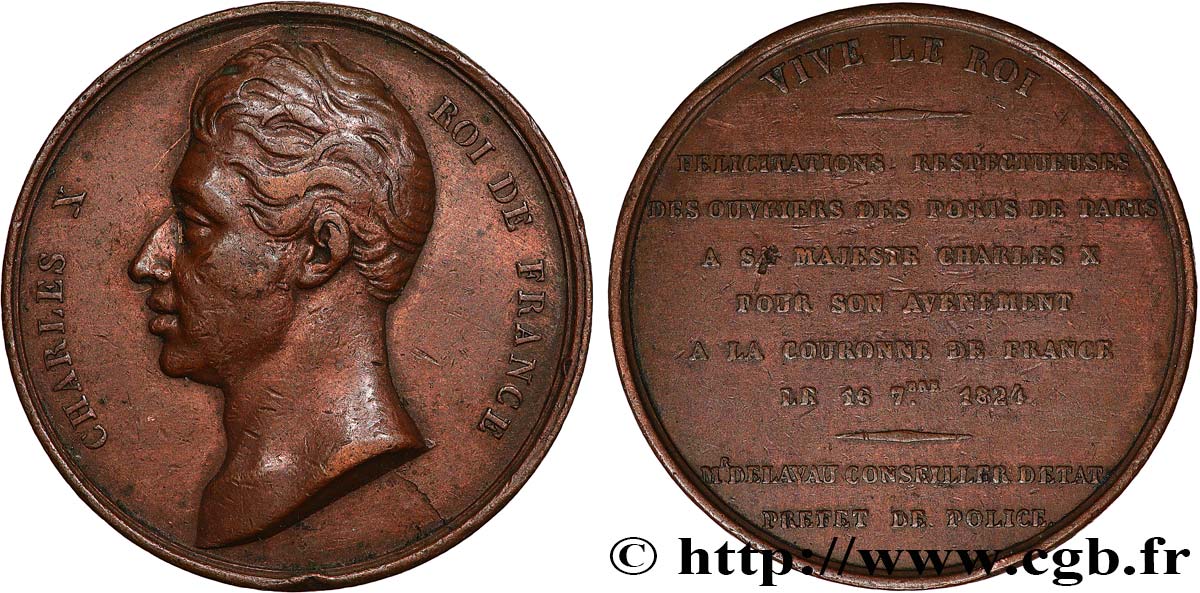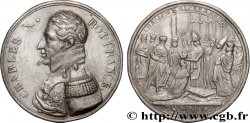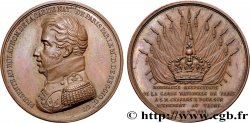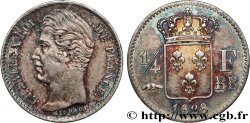fme_695389 - CHARLES X Médaille pour l’Avènement de Charles X
50.00 €
Количество
Добавить в корзину

Тип Médaille pour l’Avènement de Charles X
Дата: 1824
Металл: bronze
Диаметр: 32,5 mm
Ориентация осей монеты: 12 h.
Вес: 19,54 g.
Век: lisse
Комментарии о состоянии
Usure régulière. Présence de coups et rayures
Лицевая сторона
Аверс: легенда: CHARLES X - ROI DE FRANCE .
Аверс: описание: Tête de Charles X à gauche..
Обратная сторона
Реверс: легенда: VIVE LE ROI // FÉLICITATIONS RESPECTUEUSES / DES CHARBONNIERS DES PORTS / ET HALLES DE PARIS / A SA MAJESTÉ CHARLES X / POUR SON AVÈNEMENT / A LA COURONNE DE FRANCE / LE 16 7BRE 1824 // MR DELAVAU CONSEILLER D’ETAT / PREFET DE POLICE.
Реверс: Описание: Légende en 10 lignes.
Комментарий
Guy-Louis-Jean-Baptiste Delavau (1er juillet 1787, Doué-la-Fontaine - 9 mars 1874, château de Meslay), est un magistrat et haut fonctionnaire français. Fils d'Alexandre de Lavau, président en la Chambre des comptes de Bretagne, il fait son droit à Paris et s'installe comme avocat à Angers.
Affilié à aux Chevaliers de la Foi et à la Congrégation depuis 1807, Delavau entre dans la magistrature, devient conseiller à la cour royale de Paris le 18 septembre 1815. En 1820, il devient membre de la Chambre des vacations en 1820.
Il avait épousé en 1817 la fille de Charles-Marie d'Irumberry de Salaberry. Ils seront les parents de Henri Guy Delavau.
Le 20 décembre 1821, il est nommé préfet de police de Paris, poste qu'il assure jusqu'au 5 janvier 1828. Parallèlement, il est conseiller d'État en service extraordinaire de 1823 à 1828, année de son passage en service ordinaire.
Légitimiste, il est rayé du Conseil d'État par une ordonnance de Louis-Philippe Ier du 20 août 1830..
Affilié à aux Chevaliers de la Foi et à la Congrégation depuis 1807, Delavau entre dans la magistrature, devient conseiller à la cour royale de Paris le 18 septembre 1815. En 1820, il devient membre de la Chambre des vacations en 1820.
Il avait épousé en 1817 la fille de Charles-Marie d'Irumberry de Salaberry. Ils seront les parents de Henri Guy Delavau.
Le 20 décembre 1821, il est nommé préfet de police de Paris, poste qu'il assure jusqu'au 5 janvier 1828. Parallèlement, il est conseiller d'État en service extraordinaire de 1823 à 1828, année de son passage en service ordinaire.
Légitimiste, il est rayé du Conseil d'État par une ordonnance de Louis-Philippe Ier du 20 août 1830..








 Cообщить об ошибке
Cообщить об ошибке Распечатать страницу
Распечатать страницу Отправить мой выбор
Отправить мой выбор Задать вопрос
Задать вопрос Consign / sell
Consign / sell
 Информация
Информация









